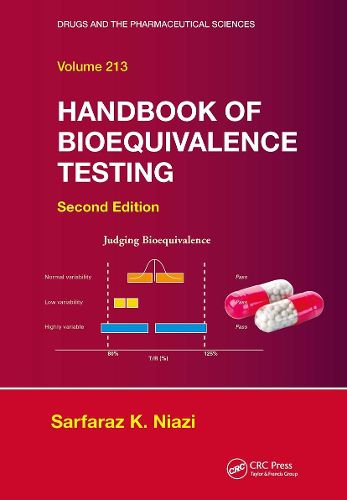Readings Newsletter
Become a Readings Member to make your shopping experience even easier.
Sign in or sign up for free!
You’re not far away from qualifying for FREE standard shipping within Australia
You’ve qualified for FREE standard shipping within Australia
The cart is loading…






As the generic pharmaceutical industry continues to grow and thrive, so does the need to conduct adequate, efficient bioequivalence studies. In recent years, there have been significant changes to the statistical models for evaluating bioequivalence. In addition, advances in the analytical technology used to detect drug and metabolite levels have made bioequivalence testing more complex. The second edition of Handbook of Bioequivalence Testing has been completely updated to include the most current information available, including new findings in drug delivery and dosage form design and revised worldwide regulatory requirements.
New topics include:
A historical perspective on generic pharmaceuticals New guidelines governing submissions related to bioequivalency studies, along with therapeutic code classifications Models of noninferiority Biosimilarity of large molecule drugs Bioequivalence of complementary and alternate medicines Bioequivalence of biosimilar therapeutic proteins and monoclonal antibodies New FDA guidelines for bioanalytical method validation Outsourcing and monitoring of bioequivalence studies
The cost of generic drugs is rising much faster than in the past, partly because of the increased costs required for approval-including those for bioequivalence testing. There is a dire need to re-examine the science behind this type of testing to reduce the burden of development costs-allowing companies to develop generic drugs faster and at a lower expense. The final chapter explores the future of bioequivalence testing and proposes radical changes in the process of biowaivers. It suggests how the cost of demonstrating bioequivalence can be reduced through intensive analytical investigation and proposes that regulatory agencies reduce the need for bioequivalence studies in humans. Backed by science and updated with the latest research, this book is destined to spark continued debate on the efficacy of the current bioequivalence testing paradigm.
$9.00 standard shipping within Australia
FREE standard shipping within Australia for orders over $100.00
Express & International shipping calculated at checkout
As the generic pharmaceutical industry continues to grow and thrive, so does the need to conduct adequate, efficient bioequivalence studies. In recent years, there have been significant changes to the statistical models for evaluating bioequivalence. In addition, advances in the analytical technology used to detect drug and metabolite levels have made bioequivalence testing more complex. The second edition of Handbook of Bioequivalence Testing has been completely updated to include the most current information available, including new findings in drug delivery and dosage form design and revised worldwide regulatory requirements.
New topics include:
A historical perspective on generic pharmaceuticals New guidelines governing submissions related to bioequivalency studies, along with therapeutic code classifications Models of noninferiority Biosimilarity of large molecule drugs Bioequivalence of complementary and alternate medicines Bioequivalence of biosimilar therapeutic proteins and monoclonal antibodies New FDA guidelines for bioanalytical method validation Outsourcing and monitoring of bioequivalence studies
The cost of generic drugs is rising much faster than in the past, partly because of the increased costs required for approval-including those for bioequivalence testing. There is a dire need to re-examine the science behind this type of testing to reduce the burden of development costs-allowing companies to develop generic drugs faster and at a lower expense. The final chapter explores the future of bioequivalence testing and proposes radical changes in the process of biowaivers. It suggests how the cost of demonstrating bioequivalence can be reduced through intensive analytical investigation and proposes that regulatory agencies reduce the need for bioequivalence studies in humans. Backed by science and updated with the latest research, this book is destined to spark continued debate on the efficacy of the current bioequivalence testing paradigm.